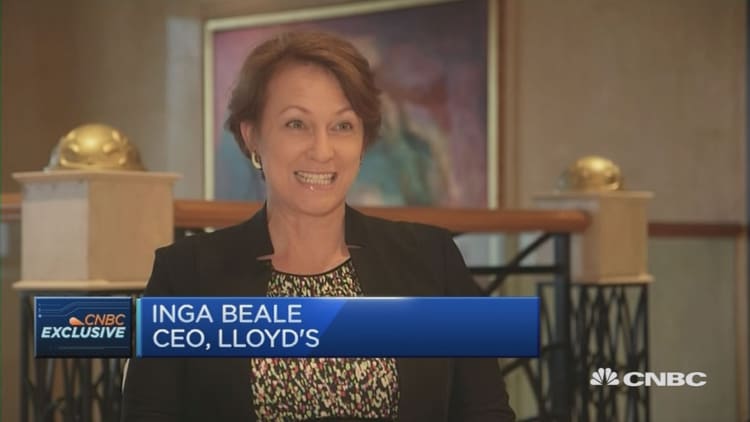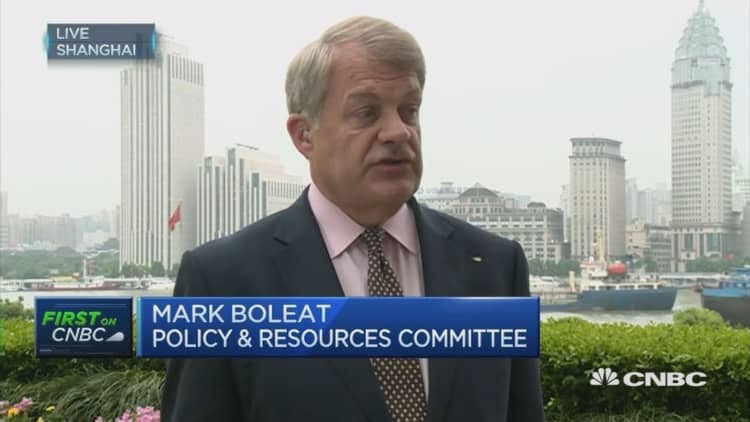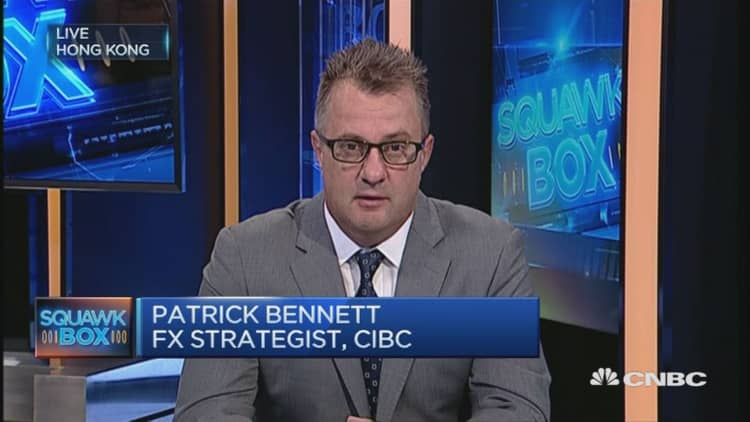

The risk the U.K. would vote to exit the European Union, an event dubbed the "Brexit," was one of the biggest risks to the global economy, Lloyd's of London CEO Inga Beale told CNBC.
She said the Lloyd's City Risk Index, which analyzed the potential economic impact of risks to the world's major cities, put the Brexit in the top three, noting that a market shock or crash was the top risk to global gross domestic product.
A version of the City Risk index for 2015-2025, created in partnership with the University of Cambridge, put a human pandemic as the second-biggest risk to key global economies. Beale noted that the index was being updated for this year.
The Brexit referendum will be held on June 23, and while betting spreads have suggested a landslide win for the remain camp, opinion polls indicated a closer call.
A poll published Friday by the Independent newspaper showed that 55 percent of respondents believed Britain should leave the EU, versus 45 percent who favored staying. The publication said it marked the largest portion of respondents who favored exiting since research firm ORB began polling the issue for it last year.
has tumbled over the past few market sessions in response to the leave-leaning polls, dropping from around $1.45 last week to around $1.4190 at 10:26 a.m. SIN/HK.
Lloyd's operates one of the world's oldest insurance markets, in which a number of "syndicates" collectively underwrite global risks.

From a company perspective, Beale said she was the remain camp.
"Because we are part of a European market, we've actually got access to one of the world's largest insurance markets, [which, with] 27 countries together, is one of the world's largest insurance markets," she said. "With those passporting rights - the ability to trade all of the other countries in Europe - that gives us a huge advantage."
Although Lloyd's underwrote insurance business in more than 200 countries and already had its own strong, existing network, Beale said that EU-wide trade deals benefited the historic market.
"We've benefited also from the trade agreements that the EU has been able to negotiate and are in the midst of negotiating a trade agreement with the U.S.," she said.
Concerns over the U.K.'s trade outlook in the event of a Brexit were echoed by Mark Boleat, chairman of the policy and resources committee for the City of London.
"It would lead to years before we could negotiate satisfactory arrangements to replace what we now have, not only with the European Union, but with the 50 or so countries with which the European Union currently has trade deals," Boleat told CNBC's "Squawk Box."
Beale also said that other cities globally could step in to take advantage if exiting the EU hamstrung London's long-held status as a financial center, of which Lloyd's is a key part.
"Whether it's competitive cities [or] competitive firms, we're always on the lookout for some way that we can make it an opportunity for ourselves," she said. "So I can assure you that's not just in Asia and here in Shanghai, but also many of the cities in Europe are thinking about how they can make the most of it."
Boleat was less certain that other financial cities would be able to take advantage, though. "I don't think any part of the world would benefit from a possible Brexit. It would cause disruption," he said.
"There are centers in Europe that think they're going to capture all the business. I think we [will] keep most of it and to the extent we lost it, there's no guarantee any business would actually go to the rest of Europe," Boleat said. "I'm sure Singapore and New York would also be expecting to pick up any business that London lost."
However, Boleat noted that the European Central Bank may require additional regulation for London financial players to continue operating within the euro zone.
"Because Britain is in the European Union, it's been able to resist that. If Britain were not in the European Union, it would be less able to resist it," Boleat said.
But Lloyd's Beale added that she did not believe Brexit was necessarily a fatal economic risk.
"Part of the reason I say that is [due to] the time it will all take to wind out, because it's not just going to happen overnight if there were an exit," she said.
Follow CNBC International on Twitter and Facebook.
—By CNBC.Com's Leslie Shaffer; Follow her on Twitter @LeslieShaffer1


